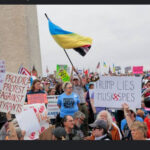CBN Injects $197.71 million to Stabilise Forex Market

The Central Bank of Nigeria (CBN) has taken a proactive step to ensure the stability of the foreign exchange market by injecting $197.71 million into the market on Friday, April 4, 2025.
This move is part of the Bank’s ongoing commitment to maintaining adequate liquidity and orderly market functioning, according to a statement released by Dr. Omolara Omotunde Duke, Director of the Financial Markets Department.
The CBN’s intervention comes at a time when the global macroeconomic landscape is undergoing significant shifts, affecting many Emerging Market and Developing Economies (EMDEs), including Nigeria.
The recent introduction of new import tariffs by the United States on goods from several economies has triggered adjustments across global markets, leading to a drop in crude oil prices by over 12% to approximately $65.50 per barrel. This downturn poses challenges for oil-exporting countries like Nigeria, influencing exchange rate dynamics and market sentiment.
Despite these challenges, the CBN remains focused on sustaining liquidity levels to support smooth market operations. The Bank’s strategic intervention is aimed at fostering a stable, transparent, and efficient foreign exchange market, and it has expressed confidence in the resilience of Nigeria’s foreign exchange framework, designed to adjust appropriately to changing economic fundamentals.
The naira, Nigeria’s official currency, crashed to N1,600
at the end of trading on April4, 2025,marking 1.91. This is the weakest level the naira has reached since December 4, 2024, when it closed at N1,608 The exchange rate has now weakened by 3.91.
According to data from the CBN, the intra-day highs and lows were reported as N1,625 and N1,519 to the dollar, respectively. The intra-day high of N1,625 is one of the highest levels recorded this year, suggesting that traders priced the naira at significantly weaker levels. In contrast, the intra-day low of N1,519/$1 indicates that some traders still priced the naira stronger, possibly betting on short-term interventions.
The NFEM rate, which represents the average exchange rate, closed at N1,567, also the weakest the naira has traded this year and since December 4, 2024.
The CBN has emphasized its continued vigilance over global and domestic market conditions and has urged all Authorized Dealers to strictly adhere to the principles outlined in the Nigeria FX Market Code, promoting transparency and upholding the highest standards in their transactions with clients and market counterparties.
As the global economic landscape continues to evolve, the CBN’s commitment to maintaining market stability and liquidity is crucial for the Nigerian economy. The Bank’s proactive measures are aimed at mitigating the impact of external shocks and ensuring that the foreign exchange market remains stable and efficient.
As the Nigerian economy continues to navigate the challenges posed by the global economic adjustments, the CBN’s proactive measures are expected to play a crucial role in maintaining market stability. The Bank’s commitment to transparency and liquidity is likely to boost investor confidence and support the growth of the Nigerian economy.









